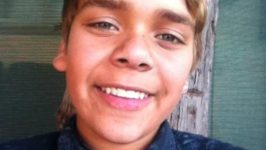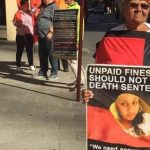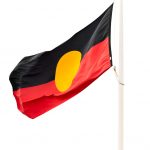Death of Elijah Doughty: No Justice for Indigenous People

The verdict in the trial of the Kalgoorlie man who fatally ran over Elijah Doughty in August last year, has laid bare the inherent racism in the Australian criminal justice system.
Last Friday, the 56-year-old non-Indigenous man – whose identity has been suppressed by the court – was cleared of the manslaughter of the 14-year-old Aboriginal boy. After six and a half hours, the all non-Indigenous jury found the man guilty of the lesser charge of dangerous driving causing death.
This was after last year’s controversial announcement that the man would be charged with manslaughter rather than murder, which sparked a riot out the front of Kalgoorlie courthouse.
The man, who stood trial last week, was the owner of a stolen motorcycle that Elijah was riding at the Gribble Creek reserve on the outskirts of Kalgoorlie-Boulder on August 29.
After being told by local police the previous day that stolen bikes often get dumped at the reserve, the man in his mid-50s was waiting in his parked Nissan Navara four-wheel drive, when the young boy rode by. He then took chase and, in less than a minute, Elijah was dead.
For the lesser charge
The man admitted he’d been acting dangerously by getting “too close”. He told police the boy was riding to the left of his vehicle, but veered in front when they were going around a bend, and he went “over the top of him.”
The man initially pleaded not guilty to both charges, but then admitted to dangerous driving occasioning death on the first day of the trial.
During the trial, state prosecutor David Davidson presented evidence that the defendant was closely following the low-powered motorbike along a “bumpy bush track,” leaving no room for the boy to move, and was aiming to push the rider off the bike.
On any version, the defendant was chasing a young boy on a motorbike along a track. The boy was not wearing a helmet, and many are of the view that these actions amount to manslaughter, at the very least.
However, the man was found not guilty of manslaughter in the Western Australian Supreme Court, and was sentenced to just three years in gaol for the dangerous driving charge. Taking into account time already served, he’ll be eligible for parole next February.
TJ Hickey
Tragically, there’s a long list of violent deaths of First Nation peoples at the hands of the non-Indigenous that trails back to when the colonisers first began their occupation.
A similar case to that of Elijah Doughty’s was the death of Thomas “TJ” Hickey in the inner Sydney suburb of Waterloo. On February 14 2014, the 17-year-old boy was impaled on the walkway fence behind the Turanga Housing Commission tower after being chased by police.
The police claimed they weren’t in pursuit even though their paddy wagon was following the teenager down a pathway. Their version of the events was that TJ collided with a gutter, and this led to him being flung into the air. This version was supported by the coroner.
However, others including the boy’s family contended that the officers were seen in pursuit, and their vehicle clipped TJ’s bicycle, propelling him onto the fence. Indeed Thomas Connar, a civilian witness, told the inquest he’d seen a paddy wagon with its lights flashing pursuing the boy, shortly before he was impaled.
On the day after the incident, TJ died in hospital due to the severity of his injuries. Thirteen years on, TJ Hickey’s family are still calling for justice, as NSW police refuse to let the officers involved stand trial.
Yet another death in custody
Despite the Royal Commission into Aboriginal deaths in custody having delivered its report in 1991, First Nations people continue to die in Australian correctional facilities and police lockups. Between 1990 and 2013, 365 Indigenous deaths occurred in custody.
Earlier this month, a 35-year-old Kamilaroi man died from unexplained head injuries sustained whilst being held in Sydney’s Parklea prison, where he was being detained after having been refused bail for minor charges.
There are conflicting accounts surrounding the death of Eric James Whittaker, a father of five from Walgett. Corrective services told the man’s family he’d fallen in the prison yard, whilst police claimed he fell in an office.
Mr Whittaker was taken to Westmead hospital after suffering a brain haemorrhage, where he was placed on life support. His family said he was shackled to his bed whilst he was in hospital. And after three final attempts at resuscitation, his life support machine was turned off on July 4.
An ongoing crisis
The passing of Mr Whittaker accounts is the third Aboriginal death in custody in NSW over the last twenty months. David Dungay, a 26-year-old Dunghutti man from Kempsey, died at Sydney’s Long Bay correctional facility in Matraville on December 29 2015.
Mr Dungay – who is Mr Whittaker’s cousin – was restrained by prison officers, even though he told them he couldn’t breathe. He was then injected with midazolam – a strong sedative – and soon afterwards turned purple and stopped breathing.
And in the early hours of July 19 last year, Rebecca Maher was found dead in her cell at Maitland police station. The 36-year-old Wiradjuri woman was taken into custody by NSW police just six hours prior to her death, after passing motorists reported seeing her in an agitated state on the road side.
Mass incarceration
The royal commission made 339 recommendations, included that arresting Indigenous people should be only occur when no other option is available, and that imprisonment should be “a sanction of last resort.” But most of these proposals have never been implemented, and Indigenous incarceration rates have soared.
There were 11,288 Aboriginal and Torres Strait Islander adults detained in the country’s prison system in March this year. The nation’s First Peoples account for only 2.8 percent of the overall Australian population, but represent 28 percent of the prison population.
This is twice the 14 percent back in 1991, the year of the royal commission’s report.
Despite all the examples of human rights abuses and cases of institutional bias that are prevalent in the Australian criminal justice system, nothing seems to change and horrific deaths like Elijah Doughty’s continue to occur without justice ever being realised.
Going to court for a traffic offence?
If you are going to court for a traffic offence, call or email Sydney Criminal Lawyers anytime to arrange a free first consultation with an experienced, specialist traffic lawyer who will accurately advise you of your options, the best way forward, and fight for the optimal outcome in your specific situation.








